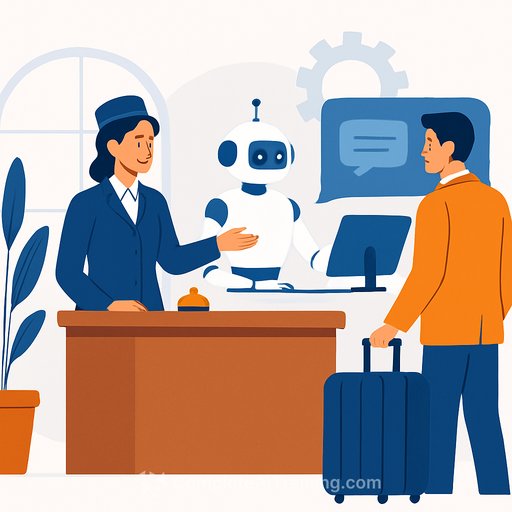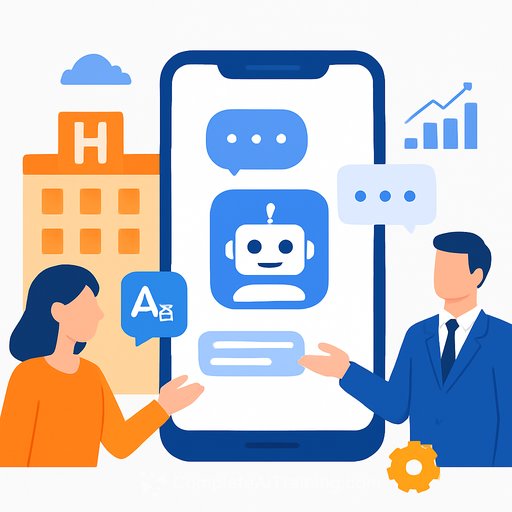Destination AI Conference: Cutting Through "AI Slop" for Hotel Leaders
AI talk is loud. Results are quiet. The Destination AI Conference for Hoteliers in Washington, DC cut through hype and focused on what moves revenue, lowers cost, and keeps guests coming back.
Here's the signal you can use now, without adding tool fatigue to your teams.
The Real Problems AI Should Solve in Hotels
- Guest engagement: Meet travelers where they are. Turn preferences into moments that stick.
- Revenue growth: Package, merchandise, and map trips to intent, not channels.
- Operational efficiency: Cut waste in the back office and at the desk. Automate the chaos, not the hospitality.
73% of hotel executives expect AI to have a significant or transformative impact. 41% still think it's 2+ years out. You can get wins now by solving smaller, repeatable problems instead of hunting a silver bullet.
Data First: Fix GIGO and Build a Backbone
Garbage in, garbage out still rules. Consolidate fragmented data, clean it, and standardize semantics across PMS, CRS, CRM, call center, and marketing systems. Your AI layer should sit on a backbone (middleware) that everything can plug into.
Make ARI portable and machine-readable so it can be consumed in real time. That is how you win direct, even as interfaces change.
Myths vs. Reality
A recent MIT statistic shared on stage said 95% of organizations studied get zero ROI from AI. The counterpoint: "success" was defined as fully scaled enterprise rollouts. Most hotels are early, running targeted pilots where ROI lives.
Consumer use of AI for trip planning is reportedly ahead of retail by 500%. Guests are already there. Follow their behavior, not industry lag.
AI won't replace you. The person using AI will.
The People Side: HI + AI
Stop throwing tools at teams. Make tech invisible and workflows obvious. Pair human interaction with AI so staff can do more of what guests feel and less of what systems require.
Adopt both top-down direction and bottom-up experimentation. Upskill your workforce, set clear use cases, and celebrate small wins to build momentum.
- Set 3 use cases per department (ex: RFP response drafting, upsell prompts, reconciliation).
- Create playbooks and short video SOPs. Track adoption weekly.
- Invest in training that maps to roles, not generic tutorials. For structured learning, see AI courses by job or a focused marketing certification.
Agent-to-Agent (A2A): The Next Battleground
It's not just B2B or B2C. AI agents will book with AI agents. Picture an Expedia agent transacting directly with a Hilton agent. To compete, your hotel must speak "machine."
- Be machine-visible: Structure content semantically so AI can find, parse, and rank you. Start with schema for hotels: schema.org/Hotel.
- Map intents: Build and bundle offers around intents (family weekend, bleisure overnight, spa escape), not just rates and dates.
- Make proof portable: Use verifiable claims, reviews, and validated data. Agents will prioritize facts over ad copy.
Your ARI and content need structure, consistency, and real-time accessibility to play in A2A commerce.
Marketing and the Customer Lifecycle
Search is shifting from keywords to contextual prompts. The disruptive moment will be transactions completed inside assistants, whether by a person or an agent. For now, less than 1% of traffic from LLMs reaches hotel websites, but that will change.
Use CRM, PMS, and shopping patterns to personalize at every touch. That could mean the right language automatically, a pre-arrival text, or a check-in prompt to offer a guest's favorite wine. This is how you move share from OTAs.
As ARI becomes portable, the classic stack (website + booking engine + app) will matter less than making your inventory bookable wherever the guest or agent is.
What the Major Brands Signaled
- IHG: Robotics pilots in China; deployment challenges in the U.S.
- Wyndham: Cost reduction focus (call centers, IoT efficiency).
- Choice: New data points fed into existing BI.
- Hilton: Clean, standardized data to reduce semantic confusion; push for common language and a data dictionary.
- Marriott: End-to-end guest conversations across the full stay.
- Hyatt: Lead scoring and RFP responses; balancing speed with governance and safety.
Everyone is experimenting. No one has fully solved fragmentation.
A Practical 90-Day Plan
- Weeks 1-2: Discovery
- List top 10 repetitive tasks by department and time spent.
- Audit data sources (PMS, CRS, CRM, reviews, ARI). Identify duplicates, gaps, and ownership.
- Weeks 3-4: Data cleanup + standards
- Define a shared data dictionary and naming conventions.
- Implement hotel schema markup on key pages; standardize room type and offer naming.
- Weeks 5-8: Pilot 2-3 use cases
- Sales: Draft RFP responses with an AI assistant; human final review.
- Front desk: Arrival prompts (upsell triggers, loyalty preferences, language).
- Marketing: Intent-based offers for two high-value segments; test in email and paid.
- Weeks 9-12: A2A readiness
- Expose ARI to approved partners via consistent APIs/feed structure.
- Rewrite content for machine readability: concise, factual, structured.
- Enablement & guardrails
- Short role-based training. Publish SOPs for prompts, approvals, and data use.
- Track KPIs: time saved, conversion lift, CSAT, call deflection, upsell rate.
Pitfalls to Avoid
- Buying tools without a clear use case and owner.
- Dirty, duplicated data across PMS/CRS/CRM.
- No human-in-the-loop for content, rates, or guest communication.
- One-off pilots with no plan to scale what works.
- Ignoring semantic structure; if machines can't parse it, they won't book it.
What's Next for Hotels and AI
AI isn't just a tool. It's a way of operating. Wins come from clean, connected data; a culture that supports learning and iteration; and a focus on specific business problems.
Shift effort from vanity dashboards to outcomes guests feel: faster service, fewer errors, smarter offers, and consistent recognition.
If your team needs structured upskilling, explore practical programs at Complete AI Training.
About Cogwheel Marketing
Cogwheel Marketing is a full-service digital agency for branded hotels. The team first maximizes brand systems, then adds channel strategies to grow total online presence. Their reporting and BI platform, Cogwheel Analytics, aggregates multiple data sources to surface trends and opportunities.
They partner with sales and revenue teams to close gaps against the comp set and within brand portfolios.
Your membership also unlocks:






